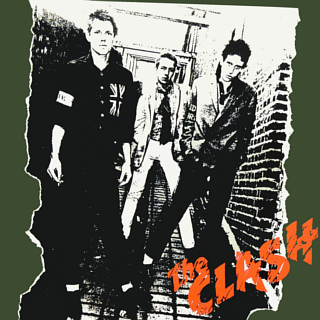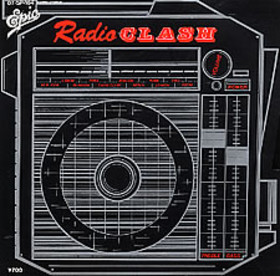
The Clash were an English rock band that formed in London in 1976 and were key players in the original wave of British punk rock. Billed as "The Only Band That Matters", they used elements of reggae, dub, funk, ska, and rockabilly, and they contributed to the post-punk and new wave movements that followed punk. For most of their recording career, the Clash consisted of lead vocalist and rhythm guitarist Joe Strummer, lead guitarist and vocalist Mick Jones, bassist Paul Simonon, and drummer Nicky "Topper" Headon.

The Clash is the debut studio album by the English punk rock band the Clash, released on 8 April 1977 through CBS Records. Recorded and mixed over three weeks in February 1977 for £4,000, it would go on to reach No. 12 on the UK charts, and has been included on many retrospective rankings as one of the greatest punk albums of all time.

Give 'Em Enough Rope is the second studio album by the English punk rock band the Clash, released on 10 November 1978 through CBS Records. It was their first album released in the United States, preceding the US version of the self-titled studio album. The album was well received by critics and fans, peaking at number two in the United Kingdom Albums Chart, and number 128 in the Billboard 200. The album is tied with Combat Rock (1982) for being the highest-charting album for the Clash in their native United Kingdom.

Paul Gustave Simonon is an English musician and artist best known as the bassist for the Clash. More recent work includes his involvement in the supergroup the Good, the Bad & the Queen and playing on the Gorillaz album Plastic Beach in 2010, which saw Simonon reunite with The Clash guitarist Mick Jones and Blur frontman Damon Albarn – and which also led to Simonon becoming the live band's touring bassist for Gorillaz's Escape to Plastic Beach Tour. Simonon is also an established visual artist.
The 101ers were a pub rock band from the 1970s playing mostly in a rockabilly style, notable as being the band that Joe Strummer left to join The Clash. Formed in London in May 1974, the 101ers made their performing debut on 7 September at the Telegraph pub in Brixton, under the name 'El Huaso and the 101 All Stars'. The name would later be shortened to the '101 All Stars' and finally just the '101ers'. The group played at free festivals such as Stonehenge, and established themselves on the London pub rock circuit prior to the advent of punk.

Combat Rock is the fifth studio album by the English rock band the Clash, released on 14 May 1982 through CBS Records. In the United Kingdom, the album charted at number 2, spending 23 weeks in the UK charts and peaked at number 7 in the United States, spending 61 weeks on the chart. The album was propelled by drummer Topper Headon's "Rock the Casbah" which became a staple on the newly launched MTV. Combat Rock continued the influence of funk and reggae like previous Clash albums, but also featured a more radio-friendly sound which alienated Clash fans. While the recording process went smoothly, the producing process of the album was tiring and full of infighting between Mick Jones and Joe Strummer. Headon's heroin addiction grew worse and he slowly became distant from the band while Strummer and bassist Paul Simonon reinstated Bernie Rhodes as manager, a move unwelcomed by Jones. The band had disagreed on the creative process of the album and called in Glyn Johns to produce the more radio-friendly sound of Combat Rock. Lyrically, Combat Rock focuses on the Vietnam War, postcolonialism, the decline of American society, and authoritarianism.

Nicholas Bowen "Topper" Headon is an English drummer and multi-instrumentalist, best known as the drummer of punk rock band The Clash. Known for his contributions to the drumming world, Headon was inducted in the Rock and Roll Hall of Fame with the rest of The Clash in 2003.

"London Calling" is a song by the British punk rock band the Clash. It was released as a single from the band's 1979 double album of the same name. This apocalyptic, politically charged rant features the band's post-punk sound, electric guitar and vocals.

"(White Man) In Hammersmith Palais" is a song by the English punk rock band the Clash. It was originally released as a 7-inch single, with the b-side "The Prisoner", on 16 June 1978 through CBS Records.

"English Civil War" is a song by English punk rock band the Clash, featured on their second album Give 'Em Enough Rope, and released as a single on 23 February 1979. It reached number 25 in the UK Singles Chart and number 29 in the Irish Singles Chart.
"I'm So Bored with the U.S.A." is a song by British punk rock band the Clash, featured on their critically acclaimed 1977 debut album, which was released in the United States in July 1979 as their second album after Give 'Em Enough Rope. It was the album's third track in the original version and second in the US version.

"Clash City Rockers" is a song by English rock band the Clash. It was first released in February 1978 as a single with the B-side "Jail Guitar Doors", the latter a re-worked version of a song from Joe Strummer's pub rock days. "Clash City Rockers" was the second of three non-album singles released between the group's eponymous first album in 1977 and their second album, Give 'Em Enough Rope (1978). It was later included as the opening track of the belated US version of the band's debut album.

"Tommy Gun" is a song by the British punk rock band The Clash, released as the first single from their second album Give 'Em Enough Rope (1978).

"This Is Radio Clash" is a song by the English punk rock band the Clash. It was released as a single in November 1981 on various formats. The song was performed live before its release, beginning with the Impossible Mission Tour of April and May 1981. A live performance was also televised on Tom Snyder's Tomorrow show on 5 June 1981.
Capital Radio is a song and an extended play by the English punk rock band the Clash. The original song has been included as "Capital Radio" or "Capital Radio One" on the Capital Radio EP (1977), Black Market Clash (1980), The Story of the Clash, Volume 1 (1988), Clash on Broadway (1991), From Here to Eternity: Live (1999), The Essential Clash (2003), and Singles Box (2006).
"Death or Glory" is a song by the English punk rock band the Clash featured on their 1979 album London Calling. The song was written by Joe Strummer and Mick Jones and features Strummer on lead vocals. The song was written about the previous generation of rock stars who swore that they would die before growing old. French rock critic Philippe Manoeuvre called it a "parody of Thin Lizzy".
"Janie Jones" is a song by the English punk rock band the Clash. It is the opening track on their debut album, The Clash (1977). The song is named after Janie Jones, a cabaret singer who organised sex parties at her Kensington home.
"Groovy Times" is a song by the Clash, featured on their The Cost of Living EP, and released as a promotional single in 1979 in Australia by Epic Records, and also included with initial pressings of the US release of the band's debut album. It was originally recorded as "Groovy Times Are Here Again" during the recording sessions for Give 'Em Enough Rope, however this demo has never been officially released, but can be found on many Clash bootlegs. It was never performed live.
The Clash were an English rock band that formed in 1976 as part of the original wave of British punk rock. Along with punk rock, they experimented with reggae, ska, dub, funk, rap and rockabilly. For most of their recording career, The Clash consisted of Joe Strummer, Mick Jones, and Paul Simonon, with Terry Chimes or Nicky "Topper" Headon on drums and percussion. The band features in several documentaries and other films.
"Garageland" is a song by English punk rock band The Clash featured as the final track for their 1977 debut album The Clash.












